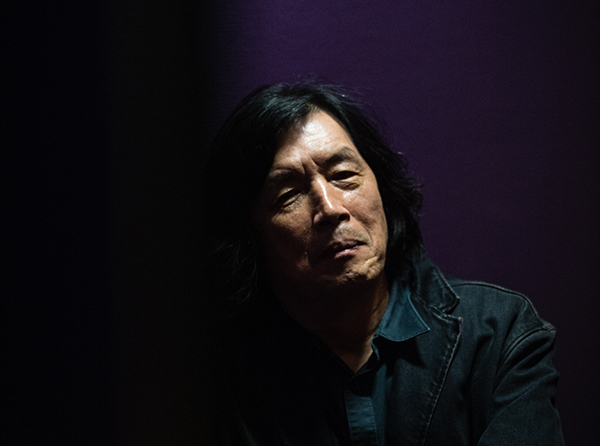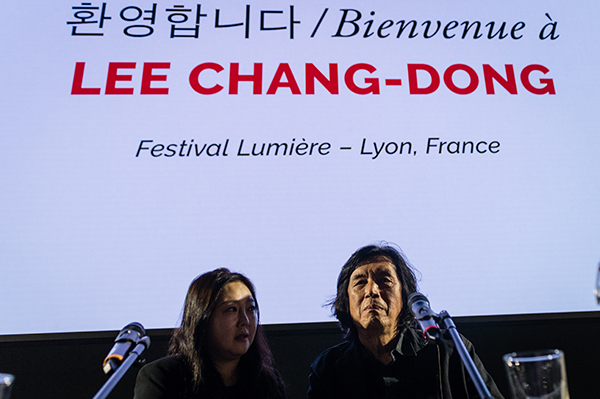Conversation
« For me, life is an adventure, a journey... »
POSTED ON OCTOBER 18 2022
"In my films, I try mainly to raise a question, not so much to convey a message. I would like this question that I try to ask through my films to make you think after the screening, and weeks afterwards. I like to have this link between the viewer and myself.”
On the family
The subject always revolves around the family. I always try to weave the story around the world we live in. When we talk about our own identity, we talk about this very important idea of family. Whether it's in our lives or in our human relationships, the starting point is the family and I try to convey that in a natural way.
Youth and the notion of age seem to be of little importance in your work.
It's true that the notion of age doesn't matter to me because no matter what age you are, I think that human nature is the same for everyone. I have sometimes been surprised by certain reactions of viewers to my films. For ‘Burning’ in particular: "How can you, as a man of a certain age, manage to identify the persistent problems of Korean youth?” I think as a man, we are all on the same level; I interact with young people, and I understand them.

© Loic Benoit
Loneliness
My characters are often plagued by loneliness, without me necessarily deciding to do so on purpose. Perhaps because I am very solitary myself. Once again, I start from the basic idea that every human being is lonely. My characters are searching for a quest. For me, life is an adventure, a journey in which we try to find meaning. Whether it is voluntary or not. I always try to show in my films that we can reflect ourselves in characters that are perhaps representatives of everyone's life. That's how I want to tell my stories.
Characters of humble background
People sometimes say to me: "Why do you only show people who are suffering?” Believe it or not, I grew up in a very underprivileged environment, and I am very used to suffering. My own older sister has the same illness as my characters in ‘Oasis’, who have limited mobility. These are people I see in my daily life.
Characters embroiled in violence
I mentioned that my characters are always searching for meaning, but they are also fighting an inner battle, raising issues of prejudice, injustice. Issues of violence in a way. This is everywhere in the world. It's something that is so embedded in our daily lives that we don't see this barbarity, but it's there. I want the audience to feel what this violence is, which is not necessarily direct violence. Like in ‘Oasis’, where the form of love that exists between the two characters takes the form of violence. I want to make it clear that ‘Oasis’ is not an ode to love. I think that in the man-woman relationship this violent side exists. This film is more about the fantasy that love represents.
Obstinacy of the characters
I would rather say that my characters are fighting a battle that they can never win. Aristotle said, "Man is always fighting a battle that can never be won", like fighting against societal restrictions, our own fate...
The landscape
I attach great importance to the environment that surrounds the characters, I avoid making artificial landscapes, I think it is very important to convey a message through the landscape, to show the environment in which my characters live. I try to reproduce exactly what I see with the naked eye through the camera.
When it comes to interiors, I try as much as possible not to recreate them in an artificial way, despite the technical challenges imposed by cramped spaces. It's very difficult to film in cramped spaces. In this case I create sets of the same scale to give the most natural look possible. ‘Oasis’ was an exception, though: if you remember, there is a scene with a baby elephant dancing with its characters, and even though it is a baby it is still too big to fit through the door. Since endangered species are protected in Korea, we went to Thailand to film this scene, bringing our own set from Korea. And the elephant was still too big to fit through the door. We had to recreate the set on a 1.5 scale.
Projection
Sometimes I shoot an average image and the viewers interpret it in such different ways that I didn't necessarily want to make sense of it. In Korea, ‘Burning’ was banned for ages under 18 because it shows a young man masturbating in front of a tower, visible from the window. The critics said that it represented male sex, but I just wanted to show what you could see through the window. Full stop.
South Korea / North Korea
When you watch my films without any prior information about Korean society, it's sometimes hard to understand but I think that everything that is individual can represent something more general. Even if you don't know Korea, I have this belief that we can share things in common. The medium of cinema is an art that allows you to really understand who others are, you can have an incredible experience by putting yourself in someone else's shoes. This notion of sharing and communicating with the different characters is fabulous, and that's why I make movies.

© Loic Benoit
Interview by Charlotte Pavard

